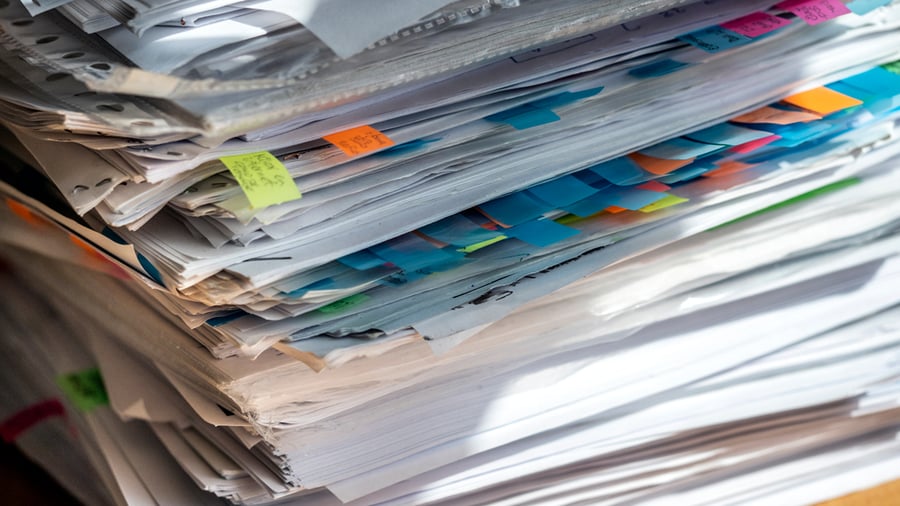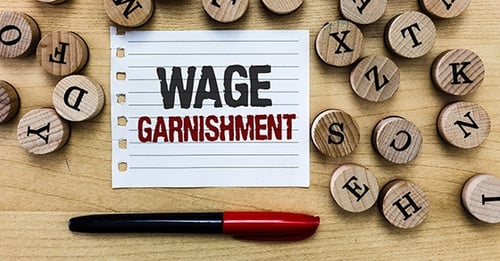Powell Tax Law Blog

For the Record: What Type of Documents to Keep and for How Long
Shred it or keep it? It’s a question many of us ask when we look at an ever-growing pile of bills, receipts, documents, and records.
While it may be tantalizing to go full Marie Kondo on your clutter, be careful of what you get rid of because many of your documents, especially tax-related records, should be kept for a certain amount of time.
“The length of time you should keep a document depends on the action, expense, or event which the document records,” says the IRS. “Generally, you must keep your records that support an item of income, deduction or credit shown on your tax return until the period of limitations for that tax return runs out.”
Period of Limitations is Key for Tax Documents
The key to keeping your tax documents is understanding the period of limitations that the IRS must work with under the law.
“The period of limitations is the period of time in which you can amend your tax return to claim a credit or refund, or the IRS can assess additional tax,” says the IRS.
The American Bar Association (ABA) says that “given the importance of the statute—both to head off audit trouble and to know when you can safely discard some of those receipts—it pays to be statute savvy.
The ABA says you should keep in mind:
- The overarching federal tax statute of limitations runs three years after you file your tax return but there are many exceptions!
- The statute of limitations is six years if your return includes a substantial understatement of income (failing to report more than 25 percent of your gross income).
- The statute of limitations can be six years also for "basis overstatements" on your tax return.
- The statute of limitations also doubles to six years if you omit more than $5,000 of foreign income on your tax return.
Keep in mind, if you fail to file a return or file a fraudulent return, there is no statute of limitation for the IRS to come after you.
“The IRS has no time limit if you never file a return or if it can prove civil or criminal fraud,” says the ABA.
Your record keeping could be the difference maker when you encounter an IRS audit.
“The statute of limitations is sometimes about good record-keeping. Proving exactly when you filed your return, or exactly what forms or figures were included in your return, can be critical,” says the ABA. “For that reason, keep scrupulous records, including proof of when you mailed your returns. The difference between winning and losing may depend on your records.”
How Long to Keep Tax Records According to the IRS
The IRS has some specific recommendations for record-keeping when it comes to the period of limitations that apply to income tax returns:
- Keep records for 3 years if situations (4), (5), and (6) below do not apply to you.
- Keep records for 3 years from the date you filed your original return or 2 years from the date you paid the tax, whichever is later if you file a claim for credit or refund after you file your return.
- Keep records for 7 years if you file a claim for a loss from worthless securities or bad debt deduction.
- Keep records for 6 years if you do not report income that you should report, and it is more than 25 percent of the gross income shown on your return.
- Keep records indefinitely if you do not file a return.
- Keep records indefinitely if you file a fraudulent return.
- Keep employment tax records for at least 4 years after the date that the tax becomes due or is paid, whichever is later.
Special rules may apply to records connected to property.
“Generally, keep records relating to property until the period of limitations expires for the year in which you dispose of the property. You must keep these records to figure any depreciation, amortization, or depletion deduction and to figure the gain or loss when you sell or otherwise dispose of the property,” says the IRS.
If you received property in a nontaxable exchange, your basis in that property is the same as the basis of the property you gave up, increased by any money you paid. You must keep the records on the old property, as well as on the new property until the period of limitations expires for the year in which you dispose of the new property.
Dividing Your Documents Into 4 “Keep Piles”
Consumer Reports says that one way to organize your financial papers and other documents is to divide them into four separate piles:
- Keep for Less Than a Year: Credit card, bank deposit, ATM, and other receipts that you need to reconcile your monthly bills. If you do not need to keep these receipts for your tax return, then you can shred them once you have accounted for them. Monthly and yearly statements for investments, insurance, utilities, and other services can be kept until new ones arrive, and then shredded.
- Keep for a Year or Longer: Hold onto auto and home loan documents until they are paid off. Hold onto documents pertaining to your autos, such as title, registration, and repairs, while you still own them. Keep purchase confirmation for stocks, bonds, and mutual funds, until you have sold them so you can establish the cost basis.
- Keep for Seven Years: Many tax experts say to keep seven years of your tax returns, and all their supporting documents, to be on the safe side since the government has six years to collect past taxes owed or start legal proceedings.
- Keep Forever: There are some documents you never want to part with including:
o Birth certificates
o Death certificates
o Marriage certificates
o Passports
o Divorce decrees
o Life insurance policies
o Pension information
o Social Security cards
o Military discharge papers
o Estate planning documents including wills
Consumer Reports recommends that important documents be stored in a fireproof safe at home, password-protected electronic file, and/or safe deposit box at a bank.
For an added layer of protection, scan your important documents and back them up to the cloud with a provider that uses the highest levels of encryption technology.







